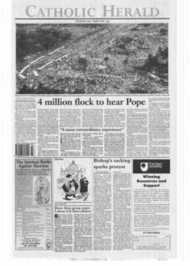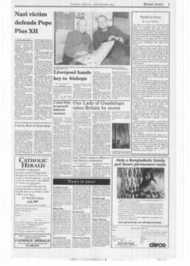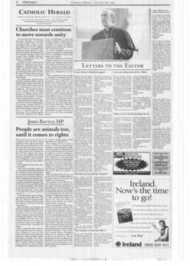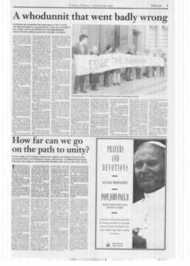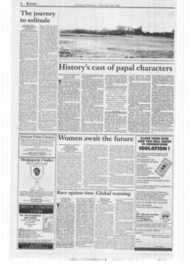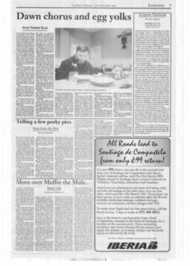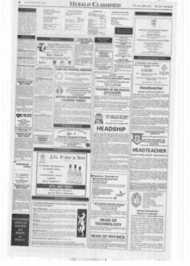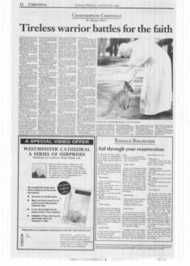Page 12, 20th January 1995
Page 12

Report an error
Noticed an error on this page?If you've noticed an error in this article please click here to report it.
Tags
Share
Related articles
Uni Theme For 2000ad
A Million Attend John Paul’s Beatification
Queen Leads Tributes To Pope
How ‘lolek’ Inherited The Keys Of St Peter
Joyful Atmosphere At St Oliver Canonisation
Tireless warrior battles for the faith
THE AUSTRALIAN visa of His Holiness Pope John Paul II will be scored in a triumphant major key, appropriate to a great national occasion.
His Holiness will list in the calendar of the Blessed a battling local lady, Mother Mary McKillop. His official confirmation of her heroic virtue will inflate Australian national pride.
It will affirm at least to the faithful that we can excel not only in sport and science and the arts, but in the more exacting disciplines of the spiritual life.
It will provide a welcome respite from the sad scandals which bedevil the Roman Catholic community in this country and elsewhere.
The burden of the Papal message is predictable: "Lift up your hearts! God's in His heaven, Father, Son and Holy Ghost, God's saints still walk the earth. Lo! Here is one, named for Christ's mother, who in her pilgrimage of service glorified God in her womanhood!"
The message delivered, His Holiness will go back to the Vatican: his own Gethsemane, the garden of his private agony where the vista opens to a restless and divided Church, a threatening world full of violence, with the Hill of Crucifixion looming dark against a blood-red sky.
Like all of us, the Pope owes God a death. He seems to be working with compulsive haste to set his stewardship in order so that he can meet this final demand.
It is late in the day for him. He is 74 years old. He has held for 16 years the most complex and least rewarding office in the world.
At the time of his election he was a vigorous, athletic man. He chose for himself the role of a travelling pastor circling the globe to proclaim the Good News in person to the scattered churches.
He was maimed by an assassin's bullet. Now he is obviously ailing ill-condi
tioned, one would think, for yet another long-haul flight, another round of ceremonies and speeches.
It is a long time now, since Leo X, the Medici Pope, was able to announce to his cronies "Since God has given us the Papacy, let us enjoy it". In this day and age, the office of' Pontiff imposes brute labour, the solitude of absolute authority and the practical impossibility of rescinding any mistake.
The legendary secrecy of the Vatican provides small protection from the spotlight of daily media scrutiny.
It is at best a gossamer garment, torn in many places, which reveals much more than it conceals.
Even so, the traditional Roman comedy still plays itself out, with a sedulous stage-management.
The setting is grandiose and the title a little old-fashioned. It is called "The Management of Princes". The theme is very simple: how you elect a man to absolute power and then limit his use of it.
Even so tough and hardheaded a man as John Paul II is not proof against the endless exactions of the performance. There are, after all, only 24 hours in his day. He has only so much human fabric to spend.
Small wonder then that he has the look of an old warrior, girding himself for one more battle, which he knows he must fight, but cannot win.
He has never been an innocent in the strategies of power, political or religious.
How could he be? In his student youth he was trained in the necessary conspiracies of survival, first under German occupation, then under the Russians, and later under a Marxist administration. He learnt early that to hold a resistance movement together one had to exercise authority to confront overt power with covert strength.
The final result was a spectacular victory, the beginning of the end of the Russian Marxist hegemony in Europe. It is only five years since Poland held its first free elections in half a century.
To many, it seems that a resurgent Poland, one in race and faith, may be the 20th century paradigm of St Augustine's City of God, where Church and State plough the parallel furrows of religion and politics for the betterment of the people of God.
Those who cherish this vision accredit Pope John Paul II as "an unassailable moral authority, the Greatest Pole of All Time".
Others see it differently. They worry about the proposed Concordat between the Vatican and the Polish Government.
They see it as a step towards a new quasi-religious state in which the clergy will be confirmed once again as a privilege caste. As one recent commentator put it:
"Now the danger is... the assumption that choice is actually the greatest source of human misery. The grey mass of humanity isn't ready for it. Consequently is it the obligation of the Great and the Good to take away the options and free people from the unhappy obligation of making the choice".
These are Polish points of view but they are specific to Pope John Paul himself. It was inevitable that, given the success of his tactics in his homeland, he should try to apply them to the universal Church.
It was also inevitable that in the big, plural world, they would fail. The hard fact is that, with the curial advisers and spokesmen he has chosen for himself, the Pontiff has painted himself into a corner.
He will not surrender the legal power bases he has already retaken: the discretions he has subtracted from his brother bishops, to vest in himself and in the dicasteries: the central administrative bodies in Rome.
For him, collegiality was always too great a risk or was it, one asks without malice, too great a leap of faith in the pervasive working of the Spirit among the people of God?
His problem, however, goes much further than empowerment in ministry. In matters of doctrine which are the credal summaries of the developing revelation of eternal mysteries he has put himself in the position where he can no longer publicly countenance reasonable doubt or encourage legitimate alternative opinion.
In too many matters of doctrine and of law, certainty has been prescribed by magisterial authority; a dangerous and alienating exercise for men and women of good will, who still stand, dirty and bloody in the arena.
Whatever their shortcomings, they still confess the faith. They cling to the hope of salvation. They cry out for the dispensation of healing charity.
They have the right to require from all their pastors an accounting and an explanation of the obedience and the interpretations imposed upon them.
They ask why no one listens to them, why no one reasons with them as Our Lord reasoned with his disciples in their puzzlements over his teachings.
They wonder, sometimes, what has happened to that oldest and most honourable of all pastoral titles Servant of the Servants of God. One thing they do understand very clearly: that they are the Church, the Pilgrim People of God. Without them the words of life would be lost in empty air.
They are painfully aware that under this Pontificate dissenters have been silenced and open debate on contentious but vital issues has been prorogued.
They know that the close counsellors of the Pontiff and his spokesmen in Rome are of a rigorist cast. They know that he has hand-picked many of the senior hierarchy and most of his cabinet, the College of Cardinals, who will also elect his successor.
In all this, the Pontiff has shown himself to be the most pragmatic of leaders if not always the most sensitive to the human condition.
Yet, like Min or not, praise him or damn him, he has always hewn to the line he has drawn on the timber.
The faithful, wryly wise in their collective experience, try to suspend a final judgement. Some of them quote hope
fully: "There's a divinity that shapes our ends, rough-hew them how we will ..."
Copyright 1995 Melaleuka East Investments Ply Ltd. First published in The Australian 14 January 1995.
blog comments powered by Disqus


